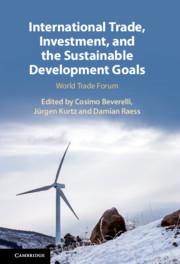Book contents
- International Trade, Investment, and the Sustainable Development Goals
- International Trade, Investment, and the Sustainable Development Goals
- Copyright page
- Contents
- Figures
- Tables
- Contributors
- Preface
- Introduction
- Part I Penetration and Diffusion of the Sustainable Development Goals
- 1 A Cross-Cutting Legal Analysis of the European Union Preferential Trade Agreements’ Chapters on Sustainable Development
- 2 The European Union’s New International Investment Policy and the United Nation’s Sustainable Development Goals
- 3 Natural Resources Management in the Sustainable Development Goals Era
- Part II Top-Down: Public Approaches to Achieving the Sustainable Development Goals
- Part III Bottom-Up: Private Sector and Civil Society Initiatives on the Sustainable Development Goals
- Index
- References
1 - A Cross-Cutting Legal Analysis of the European Union Preferential Trade Agreements’ Chapters on Sustainable Development
Further Steps Towards the Attainment of the Sustainable Development Goals?
from Part I - Penetration and Diffusion of the Sustainable Development Goals
Published online by Cambridge University Press: 18 September 2020
- International Trade, Investment, and the Sustainable Development Goals
- International Trade, Investment, and the Sustainable Development Goals
- Copyright page
- Contents
- Figures
- Tables
- Contributors
- Preface
- Introduction
- Part I Penetration and Diffusion of the Sustainable Development Goals
- 1 A Cross-Cutting Legal Analysis of the European Union Preferential Trade Agreements’ Chapters on Sustainable Development
- 2 The European Union’s New International Investment Policy and the United Nation’s Sustainable Development Goals
- 3 Natural Resources Management in the Sustainable Development Goals Era
- Part II Top-Down: Public Approaches to Achieving the Sustainable Development Goals
- Part III Bottom-Up: Private Sector and Civil Society Initiatives on the Sustainable Development Goals
- Index
- References
Summary
The UN Sustainable Development Goals (SDGs) established under the 2030 Agenda espouse a notion of sustainable development articulated along three integrated dimensions: economic development, social development and environmental protection. When exploring relevant trade regimes, the 2030 Agenda considers exclusively the role of the WTO. In this way, significant evolutions in the international trade agenda are overlooked, in particular the growing efforts on the conclusion of trade liberalisation deals on a preferential basis. One distinctive feature of these negotiations is the emergence of a common will to reach an agreement on sustainable development issues. As a result, most recent preferential trade agreements (PTAs) usually include a chapter on trade and sustainable development (TSD) covering both the promotion of labour rights and the protection of the environment. In view of this evolution, the question arises as to whether and to what extent the PTAs contribute to the attainment of the SDGs. Against this background, this chapter offers a legal appraisal of the environmental provisions included in the TSD chapters of the latest EU PTAs. This practice is relevant, in view of the role the EU has been playing in the setting of the current network of PTAs and in the negotiations for multilateral environmental agreements.
Keywords
- Type
- Chapter
- Information
- International Trade, Investment, and the Sustainable Development GoalsWorld Trade Forum, pp. 15 - 49Publisher: Cambridge University PressPrint publication year: 2020



